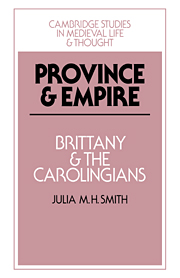Book contents
- Frontmatter
- Contents
- List of illustrations
- Acknowledgements
- List of abbreviations
- Note on nomenclature
- 1 Neustria, Brittany, and northern Aquitaine
- 2 Redon and environs
- Introduction
- 1 Settlement and society in dark age Brittany
- 2 Neustria and the Breton march
- 3 The Bretons in the Christian empire of Louis the Pious
- 4 Carolingian hegemony and Breton revolts, 840–874
- 5 An anatomy of power
- 6 Churches and learning in Carolingian Brittany
- 7 The end of Carolingian Brittany
- List of manuscripts cited
- Bibliography
- Index
- Cambridge studies in medieval life and thought Fourth series
1 - Settlement and society in dark age Brittany
Published online by Cambridge University Press: 26 October 2009
- Frontmatter
- Contents
- List of illustrations
- Acknowledgements
- List of abbreviations
- Note on nomenclature
- 1 Neustria, Brittany, and northern Aquitaine
- 2 Redon and environs
- Introduction
- 1 Settlement and society in dark age Brittany
- 2 Neustria and the Breton march
- 3 The Bretons in the Christian empire of Louis the Pious
- 4 Carolingian hegemony and Breton revolts, 840–874
- 5 An anatomy of power
- 6 Churches and learning in Carolingian Brittany
- 7 The end of Carolingian Brittany
- List of manuscripts cited
- Bibliography
- Index
- Cambridge studies in medieval life and thought Fourth series
Summary
Western Christendom in the early Middle Ages was a mosaic of local, small-scale societies. Each part of a mosaic has its own colours and patterns and dynamic; one portion may shade imperceptibly into the next, or be separated from it by clear boundaries and discontinuities of theme. And yet each individual piece is part of a whole in which meanings, rhythms, and techniques are common throughout. Thus it was in the early Middle Ages. Kingdoms, even empires, comprised provinces each with its own history, traditions, culture, social structure. Some regions had much in common with their neighbours; elsewhere formidable natural barriers and conflicting loyalties served to set communities apart. Nevertheless, throughout Europe, all societies derived almost all their wealth from an overwhelmingly agricultural economy, and did so in the face of high human mortality and low crop yields. Most, though not all, of Latin Christendom shared too a common, Roman past; everywhere the Christian church propagated a common morality and literary culture, and everywhere that culture found its own local and idiosyncratic expression.
Early medieval societies were also highly stratified: plunder, tribute, taxation, and other forms of surplus extraction sustained the power and status of a small elite. With rare exception, that stratification took for granted monarchy as the only appropriate form of government, whether or not the ruler's formal title was that of ‘king’.
- Type
- Chapter
- Information
- Province and EmpireBrittany and the Carolingians, pp. 8 - 32Publisher: Cambridge University PressPrint publication year: 1992

